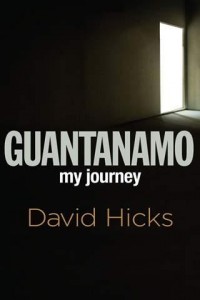Review: Guantanamo – My Journey
 The controversy surrounding the detention of David Hicks at Guantanamo Bay by the United States government has waned. In the aftermath of 9/11 and the invasions of Iraq and Afghanistan – in that era when the War on Terror was a novelty, not a socio-political framework, when the soundbites were filled with Bush and Howard – it was another matter. Do you remember the banners, the protests? Do you recall how the Hicks factor played out in the political tumult of 2007, when he was plea bargained to freedom, but Rudd was elected anyway?
The controversy surrounding the detention of David Hicks at Guantanamo Bay by the United States government has waned. In the aftermath of 9/11 and the invasions of Iraq and Afghanistan – in that era when the War on Terror was a novelty, not a socio-political framework, when the soundbites were filled with Bush and Howard – it was another matter. Do you remember the banners, the protests? Do you recall how the Hicks factor played out in the political tumult of 2007, when he was plea bargained to freedom, but Rudd was elected anyway?
Yes, that David Hicks.
I wondered when he would speak out. There was a control order and a gag order in place when he was released. But the times, they have a-changed. And Guantanamo – My Journey, Hicks’ own account of his life before and during his five-and-a-half year ordeal is well and truly published. I have found it a fascinating read. It is also the first ever official “ebook” that I have owned and read.
So what do I think? He writes with a precise and articulate tone. It is somewhat askance to the account of the lack of education of his early life – the school dropout jackeroo. I suspect a ghost writer, but then again he has a clear motivation to form his words well and tell his side of the story – to have his day in the media courthouse.
The big question of course is – was he actually guilty of anything? Is this his own form of propaganda to play himself in a good light? He was self admittedly naive – some would say stupid – to imagine that joining militant organisations in Kosovo and Kashmir would not land him in some sort of trouble.
At times it feels like he is playing to a politically correct audience as he covers his adventures in a “I was just concerned for the oppressed” light. For sure I do not suspect that he was a terrorist in any way – but his declaration that “I have never killed anyone or attempted to. I have never hurt or injured anyone during my travels, nor did I try to” beggars a certain amount of belief; he joined a military organisation with no intention to use force?
He tells his story well, however, and I found myself caught up in the narrative – I was interested in his interest in Islam, and its later waning, his desire to travel, the way he described the internal struggles of his incarceration. I found myself trying to imagine the various scenes, to get some sense of the experience.
The second part of the book – the account of his detention – is well footnoted. It provides corroboration to his story and demonstrates clearly and convincingly the inhumanity of an American militarised bureaucracy. Even tonight, on the eve of the tenth anniversary of 9/11, I was watching Dick Cheney on the news declaring that the use of torture was justified and justifiable. I felt a surge of injustice.
The heroes I was looking for are there – Terry Hicks, the dogged father, Major Mori, the principled military lawyer. I’m not sure if I put David Hicks in that category – while tenacious and amazingly robust, there is little heroism in his character – just much to be pitied and regretted and ultimately relieved about.
This is a sorry story. But it is still a story of our times. And it should be read.





